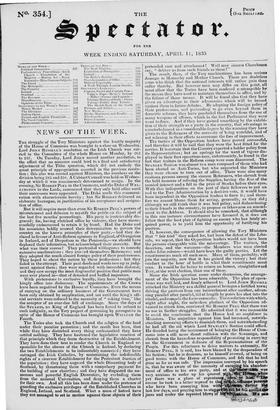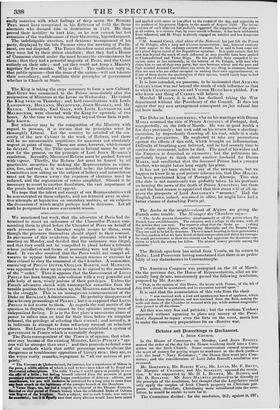NEWS OF THE WEEK.
THE struggle of the Tory Ministers against the hostile majority of the House of Commons was brought to a close on Wednesday.
Lord JOHN RUSSELL'S resolution on the Irish Church was car- ried in the Committee of the whole House on Monday, by 262 to 237. On Tuesday, Lord JOHN moved another resolution, to
the effect that no measure could lead to a final and satisfactory adjustment of the Tithe question, which did not embody the great principle of appropriation asserted in the previous resolu- tion : this also was carried against Ministers, the numbers on the division beino. 285 and 258. A Cabinet Council was held on Wednes- day at which it was unanimously determined to resign. In the
evening, Sir ROBERT PEEL in the Commons, and the Duke of WEL- LINGTON in the Lords, announced that they only held office until their successors were appointed. The Duke made this communi- cation with characteristic brevity ; but Sir ROBERT delivered an elaborate harangue, in justification of his acceptance and resigna- tion of office.
But it will require more than even Sir ROBERT PEELS powers of
misstatement and delusion to mystify the public en the subject of the last five months' proceedings. His party is irretrievably dis- graced; for, having clutched office by violence, they have unsuc- cessfully endeavoured to retain it by fraud. Had the Duke and his associates boldly avowed their determination to govern the country on the known principles of their party,—had they de- clared in favour of Anti-Reform opinions in England, of Orangeism in Ireland, and of Despotism in the Peninsula,—we should have deplored their infatuation, but acknowledged their sincerity. But what was their course? They pretended willingness to concede extensive ameliorations ; they avowed themselves Reformers; and they adopted the much-abused foreign policy of their predecessors. They hoped to cheat the nation by these professions : but they failed in the attempt. Their past deeds and words rose up in judg- ment against them; they were regarded with incurable distrust; and they now occupy the most disgraceful position that public men were ever placed in—that of detected and battled impostors. With pretensions to exclusive loyalty, they have brought the kingly office into dishonour. The appointments of the Crown have been negatived by the House of Commons. Even the means of carrying on the ordinary business of the Government have been only obtained by supplication, and not until the King's offi- cial servants were reduced to the necessity of " asking time," like
the acceptor of an over-due bill of exchange. Since the days of the STUARTS, no Kil"? of England has been forced to submit to such indignity, as the Tory project of governing by prerogative in spite of the House of Commons has brought upon WILLIAM the Fourth.
The Tories also took the Church and the religion of the land under their peculiar protection ; and the result has been, that while they have disturbed every thing ecclesiastical they have settled nothing. They have hastened the legislative sanction of that principle which they deem destructive of the Establishment. They have done their best to render the Church in England re- sponsible for the abuses of the Church in Ireland, by declaring the two Establishments to be indissolubly connected ; they have outraged the Irish Catholics, by maintaining the indefeasible Rights of a sinecure Establishment for the Protestant fraction of The population; they have angered the whole Dissenting body of
Scotland, by threatening them with a compulsory payment for the building of new churches ; and they have disgusted the nu- merous and powerful English Dissenters, by excluding them from the national Universities, and denying them a charter for their own. And all this has been done under the pretence of guarding the exclusive privileges of the Established Churches in England, Ireland, and Scotland. What a mass of hatred have they not managed to set in motion against those objects of their
pretended care and attachment! Well may sincere Churchmen say, " deliver us from such friends as these !" The result, then, of the Tory machinations has been serious damage to Monarchy and Mother Church. There are doubtless some who think that the national interests will rather gain than
suffer thereby. But however men may differ on this point, all must allow that the Tories have been rendered contemptible by
the means they have used to maintain themselves in office, and by the failure of those means. It will be found also that they have given an advantage to their adversaries which will be turned
against them in future debates. By adopting the foreign policy of their predecessors, and pretending to go even beyond them in domestic reforms, they have precluded themselves from the use of many weapons of offence, which in the last Parliament they were wont to draw. And if they have gained something by the exhibi- tion of their strength as a party in the country, that advantage is counterbalanced in a considerable degree by the warning they have given to the Reformers of the necessity of being watchful, abd of not relaxing in their efforts to overcome the foes of improvement. The tactics of the Opposition leaders have proved successful, and therefore it will be said that they were the best fitted for the . service. lt is certain that the Country expected a bolder policy from its Representatives; but an apology for the want of vigour dis- played in their first operations may, unfortunately, be found in the fact that traitors in the Reform camp were soon discovered. The STANLEY Section was almost to a man composed of those who had been elected as Anti-Tories, but who supported the Ministers they were chosen to turn out of office. There were also many cautious persons among the sincere Reformers, who shrunk from the bold measure of refusing the Supplies, having the fear of' the monied interest and a fall in the price of Stocks before their eyes. With this indisposition on the part of their followers to put an end to the Tory Administration by a decisive vote, it would have been imprudent in the Opposition leaders to force it ; and there- fore we cannot blame them for acting, generally, as they did ; although we still think that it was bad policy, and disheartening to their friends in the country, to propose so lukewarm an amend- - ment to the Address. It should also be remarked, that although in this one instance circumstances have favoured it, it does not follow that the best plan of fighting an enemy who has lately ac- quired power, is to yield him the opportunity of fortifying his position.
If, however, the consequence of allowing the Tory Ministers that " fair trial" they asked for, had been the defeat of the Libe- rals, we repeat, that the Opposition leaders would not have been the persons chargeable with the miscarriage. The traitors, the deserters, and the waverers—the Members who were elected under false colours—would have been the guilty parties. Let the constituencies mark all such men. Many of them, probably, will join the majority, now that it has gained the victory ; but their conduct in the hour of battle is what their constituents must scan. It would be far better to return an honest, straightforward Tory, at the next election, than one of these.
Since the Irish question came under discussion, the manage- ment of the Opposition has been admirable. The plan of opera- tions was well laid, and firmly adhered to. Lord JOHN RUSSELL attacked the Ministry as a skilful general besieges a fortified town; driving the garrison from one intrenchment after another, advan- cing parallel after parallel, till at length he pours his shot into the citadel, and compels the foe to surrender. The resolution with which, night after night, the unbroken phalanx of the Opposition ad- vanced to attack him, convinced Sir ROBERT PEEL that there was no use in further struggles. Ile admitted that it was impossible to avoid the conclusion that the House had no confidence in Ministers. The majorities against him had increased, notwith- standing unceasing efforts to diminish them, and notwithstanding he had all the aid which Lord STANLEY'S Section could afford. He dreaded being the instrument of bringing the House of Com- mons into a stilt more direct collision with the Sovereign, and shrunk from the hazardous responsibility of persisting in carrying on the Government in defiance of the Representatives of the People. For this reluctance to drive matters to extremity, Sir ROBERT PEEL, it is said, has been blamed by the desperadoes of his faction; but he is desirous, as he himself avowed, of being on good terms with the House of Commons, and felt that he had gone as far as was safe. The impression conveyed by his speech
is, that he was aware of the necessity of excu his abandon-
ment of office to his own party, and at • tills was
very anxious to make up his quarrel 11,,
yet there was a place of repentan Tc.7p) course he took is a bitter reproof to th Iii gIcions persons
who have been annoying him wit during silo
last few days, and praying him to stage oA .1kbi'feli am last-the jeers and under the repeated won of us. AVA easily conceive with whet feelings of deep scorn Sir ROBERT PEEL must have recognized in his flatterers of 1833 the fierce alarmists who doomed him to destruction in 1829. He then proved their inability to hurt him, as he now cannot but feel conscious of the worthlessness of their blustering, bigoted support.
The indefatigable exertion, and dextrous management of his party, displayed by the late Premier since the meeting of Parlia- ment, are not disputed. The Tories therefore must recollect, that they were led by their ablest chieftain; that they had a House of Commons elected under the most favourable circumstances for them ; that they had a powerful majority of Peers, and the Court entirely on their side ;—and yet they could not keep a Ministry together for five months. Why is this ? The sufficient reply is, that public opinion—that the mass of the nation—will not tolerate their ascendancy, and repudiate their principles of government whether in Church or State.



























